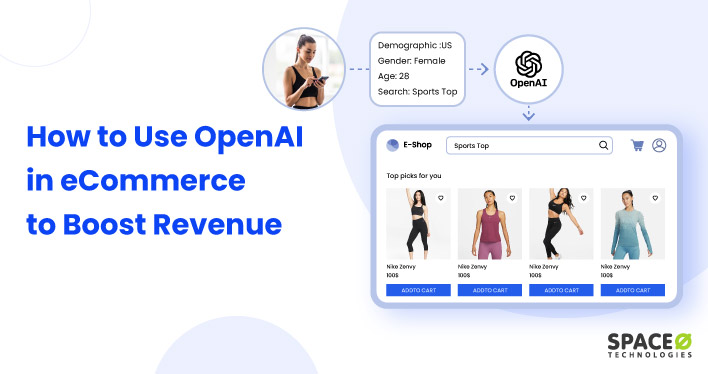If you have an eCommerce website or an eCommerce platform, you will find this blog helpful. In this blog, you will learn how to use advanced OpenAI and ChatGPT-based technologies to improve your eCommerce platform.
OpenAI’s advanced natural language processing and machine learning capabilities help eCommerce businesses improve customer experience, provide personalized shopping experience, and automate processes, leading to increased efficiency and revenue.
Infact, according to Statista, OpenAI ranks among the most funded machine-learning startup firms in the world, with funding of over 1 billion U.S. dollars as of January 2023.
Being a leading AI-based eCommerce website development services provider, we have AI developers who have the skills and experience to use OpenAI in eCommerce platforms.
- 5 core challenges that almost every eCommerce website owner is facing currently
- How to use advanced AI technologies like OpenAI or AI to solve these core eCommerce challenges
By the end of this blog, you will learn:
Let’s get started.
Table of Contents
5 Burning Challenges for eCommerce Websites and Platforms
Let’s understand the 5 core problems of an eCommerce platform.
Slow site search speed:
When customers use the search function to look for a product, the results take longer than expected to appear. This can be caused by various factors, such as slow server response times, inefficient selection of search algorithms, or a large volume of data to search through. A decrease in search speed results in frustration for customers, as they may abandon their search and go to a competitor’s website instead. It can also result in lower conversion rates and ultimately, decreased revenue for the eCommerce business.
Problem with the zero search query:
When a customer performs a search query on an eCommerce website, the site does not return any relevant results. Most of the time, the website doesn’t understand the product semantics or the user’s intent behind the search term even though the product is there in the database. Without the ability to analyze the context and meaning behind a user’s search query, the website misses the relevant products or returns irrelevant sales.
Not accurate product recommendations:
eCommerce businesses with large product catalogs struggles to suggest relevant products based on each customer’s unique preferences. Traditional recommendation systems using basic algorithms such as collaborative filtering may not provide accurate suggestions, particularly when data on customer behavior is limited or preferences are diverse.
Dealing with frustrated customers:
The challenge of customer frustration and customer complaints in the eCommerce platform arises from the need to provide high-quality support to customers who may have questions or concerns about products, orders, or shipping. This can be especially challenging for large eCommerce businesses with high volumes of customer inquiries, as providing personalized support to each customer can be time-consuming and costly.
Creating compelling product descriptions for a large number of products:
Descriptions must accurately convey key product features and benefits, while also engaging customers with compelling language and imagery. This can be especially difficult for products with complex or technical features.
So, above are the 5 challenges that the eCommerce industry generally faces. Let’s now understand how OpenAI helps to resolve these challenges.
How to Use OpenAI Technology to Resolve These eCommerce Challenges and Improve Revenue
Here we have described how OpenAI technology helps to overcome 5 core challenges in the eCommerce industry.
How to Use OpenAI to Improve Site Search Speed
OpenAI offers a range of powerful tools and models that can be used to improve search speed in eCommerce businesses. Here are a few ways you can leverage OpenAI to optimize your website’s search function:
- Implementing GPT model to enhance NLP capabilities: GPT models are designed to process large volumes of text data and generate human-like responses. By integrating GPT models into your search function, you can improve the accuracy of search results and provide a more personalized customer experience. Apart from this there are many advantages of creating an NLP app using OpenAI which vastly improve the performance of an ecommerce app.
- Develop a site search bot using OpenAI: OpenAI’s language models and NLP capabilities can be used to build an eCommerce search bot that understands natural language queries and provides relevant search results. By developing a search bot, you can enhance the accuracy and speed of your website’s search function and provide a more personalized and efficient search customer experience.
- Leverage OpenAI’s API to access pre-trained models: OpenAI offers a range of pre-trained models that can be accessed through its API. By using these models, you can reduce development time and resources, while still benefiting from powerful machine-learning capabilities.
With the use of the above ways, you can increase the site search speed of your eCommerce solution. In fact, we have recently developed an eComChat- an AI-powered eCommerce Search Bot that increased the speed of online stores by 23%. This ChatGPT-like eCommerce site search solution uses OpenAI technology and 20,000 external data of eCommerce products to provide quick and relevant search results based on the user’s intent.
How to Use OpenAI to Resolve Zero Search Query Problem
OpenAI is used to resolve zero search query problems by leveraging machine learning algorithms and natural language processing (NLP) techniques to provide personalized and relevant search results, even when there are no exact matches to the search query.
Here are some ways to use OpenAI to resolve zero search query problems:
- Auto-correct and suggest alternatives: With OpenAI, you get auto-correct and suggestion features that provide alternative search terms that are more likely to yield results. These AI tools help customers who may have misspelled a search term or used an uncommon phrase.
- Implementing semantic search capabilities: By implementing semantic product search capabilities, these websites can better understand the meaning behind a user’s search query, even if it contains misspellings, synonyms, or related concepts. This results in accurate and relevant search results for the user, reducing the chances of returning zero search results. With semantic search capabilities, eCommerce websites suggest alternative search terms providing a better customer experience and potentially increase in sales.
- Expand the search scope: Use OpenAI-powered algorithms to expand the search scope and include related terms or concepts. It allows customers to discover related products or information that they may not have considered.
- Product mapping: By mapping products based on similar features or categories, the system can suggest alternative products to customers who enter zero search queries.
For example, if a customer searches for “red shirt,” but the website has no matching products, the system can suggest “red tops” or “red blouses” instead. - Personalized recommendations: By analyzing customer purchasing and browsing history, the system can suggest products that are likely to be of interest to the customer.
These personalized recommendations can be based on previous purchases, search queries, or other customer data. - Machine learning algorithms: Using machine learning algorithms, the system can learn from previous search queries and suggest products that are likely to be relevant based on user behavior. It even uses deep learning algorithms to improve the accuracy of search results and reduce the likelihood of zero search queries.
- Natural language processing (NLP): NLP can be used to analyze customer search queries and identify keywords or phrases that may not have matched any products in the eCommerce website’s database. NLP techniques analyze the intent behind the search query and provide more relevant results. Based on the identified keywords or phrases, the system can identify synonyms, related concepts, and contextual information or similar products to provide more personalized results.
You can resolve zero search query problems by using the above ways to improve the search results experience using OpenAI. Using machine learning techniques, you will not only solve zero search query problems but also increase user engagement and satisfaction levels.
How to Use OpenAI to Write Compelling Product Recommendation
By performing customer data analysis, and understanding browsing history, OpenAI algorithms identify trends and patterns. With the use of artificial intelligence, eCommerce businesses can provide personalized and relevant recommendations based on a variety of factors, such as customer preferences, product attributes, and contextual information.
Let’s understand in detail.
- Collaborative filtering: Collaborative filtering is a machine learning technique that analyzes customer behavior, such as previous purchases, and uses this information to make personalized product recommendations. It is effective when there is a large amount of customer data available, but it can be limited when customer behavior is not well-defined.
- Content-based filtering: Content-based filtering is a recommended method that analyzes product features and attributes, such as size, color, and material, to suggest similar products to customers. This method is effective when customer behavior is not well-defined, but it can be limited when products have similar features or attributes.
- Hybrid filtering: Hybrid filtering is a combination of collaborative and content-based filtering that can provide more accurate and personalized product recommendations to customers. By leveraging both customer behavior and product features, the system can suggest products that align with customer preferences.
- Reinforcement learning: Reinforcement learning is a machine learning technique that can be used to improve product recommendations over time. By rewarding the system for accurate recommendations and penalizing it for inaccurate ones, the system can learn and adapt to customer behavior.
Using the above machine learning techniques in OpenAI, eCommerce businesses can provide accurate and personalized product recommendations to customers. This improves customer experience and drive sales.
How to use OpenAI to Deal with Frustrated Customers
By automating routine tasks, such as answering frequently asked questions, scheduling appointments, or processing simple algorithms, OpenAI helps eCommerce businesses reduce response times and improve efficiency. Additionally, machine learning algorithms can be used to analyze customer feedback and behavior to provide personalized support and identify potential issues before they escalate.
Here are some ways to use OpenAI to resolve customer service problems
- Developing custom OpenAI-powered chatbots: With the use of Open AI-powered chatbots, it can handle customer inquiries and provide real-time support. AI-powered chatbots can handle a wide range of tasks, such as answering frequently asked questions, providing product recommendations, and resolving customer issues.
- Customer sentiment analysis: Use OpenAI-powered sentiment analysis to analyze customer feedback and gain insights into customer satisfaction levels. This help businesses identify areas for improvement, incorporates positive sentiment into product descriptions, and addresses customer concerns.
- Personalized product suggestions: With the use of recommendation systems, OpenAI personalizes customer experiences and provides relevant product suggestions. With a clear understanding of customer preferences and behavior, online stores can provide a more tailored and engaging customer experience.
- Voice assistants: OpenAI-powered voice assistants can provide hands-free customer support. This can include tasks such as placing orders, checking order status, and accessing account information.
- Automated responses: Automated responses developed using OpenAI handle repetitive inquiries and support requests. This frees up customer service agents to focus on more complex issues and provide more personalized support.
By using the above OpenAI-powered techniques, an eCommerce store can save time, drive sales and optimize operations related to customer service.
How to Use OpenAI to Write Compelling Product Descriptions
OpenAI can be used to improve the challenge of writing compelling product descriptions by leveraging natural language processing (NLP) and machine learning algorithms to generate high-quality product descriptions.
Here are some ways to use OpenAI to improve product descriptions:
- Text summarization: Using OpenAI API for text summarization can condense lengthy product descriptions into shorter and more concise summaries. Summarization provide customers with a quick and clear understanding of the key features and benefits of a product.
- Language translation: With the use of OpenAI-powered language translation, OpenAI API translates product descriptions into multiple languages. With language translation, eCommerce businesses reach a global audience and expand their customer base.
- Product attributes extraction: Using the OpenAI-powered product attribute extraction method, automatically extract important information from product descriptions, such as brand, color, size, and material. This improves the accuracy and completeness of product descriptions.
By condensing, translating, extracting, generating, and analyzing product descriptions, eCommerce businesses can write attractive product descriptions, save time and optimize operations.
The above are the 5 use cases of using OpenAI in the eCommerce industry. If you still have doubts let’s understand them by frequently asking questions.
Want to Create an AI-enabled eCommerce Platform?
Let’s discuss your idea – Our AI consultants will assess feasibility and guide you through the next steps.

Want to Hire AI Developers to Improve Customer Service?
Get in touch with us. We have skilled AI developers who understand OpenAI technology and can develop search bots that increase site search speed, provide personalized recommendations, and increase customer experience.
Frequently Ask Questions About Using OpenAI in eCommerce Industry
Can OpenAI help to reduce shopping cart abandonment rates?
Yes, OpenAI can help reduce shopping cart abandonment rates by leveraging machine learning algorithms to identify trends and patterns in customer behavior and provide personalized recommendations and incentives.
For example, Open AI-powered chatbots can remind online shoppers of items left in their cart and provide personalized discounts to encourage them to complete the purchase. Additionally, machine learning models analyze customer behavior to identify the most common reasons for cart abandonment, such as high shipping costs or a complicated checkout process, and suggest ways to address these issues.
How to use natural language processing (NLP) to improve our search functionality
NLP can be used to improve search functionality by analyzing customer queries and matching them to relevant products and information.
For example, NLP models identify synonyms and related terms to expand search results or suggest alternative products based on customer preferences and past behavior. Additionally, NLP can be used to improve the accuracy of product descriptions and metadata, which can improve search relevance and results.
What type of data do we need to train our machine-learning models?
To train machine learning models, eCommerce businesses typically need large volumes of relevant and diverse data, such as customer behavior and preferences, product information, and historical sales data. The quality and diversity of this data are crucial to the accuracy and effectiveness of the models, and eCommerce businesses may need to invest in data collection and cleaning processes to ensure they have the necessary information to train their models.
How to ensure the ethical use of OpenAI in our eCommerce operations
To ensure the ethical use of OpenAI in eCommerce operations, eCommerce businesses should be transparent about their use of these technologies and prioritize customer privacy and data security. They should also consider the potential impact of these technologies on vulnerable populations and ensure that their use does not perpetuate bias or discrimination.
Let’s Integrate OpenAI Technology Into Your eCommerce Platform
You have learned about how integrating OpenAI in eCommerce improves the shopping experience for customers drives sales and increases customer satisfaction and loyalty by just using OpenAI.
Space-O technologies, being a GPT3 app development services provider, helps you integrate OpenAI into your eCommerce product, allowing you to take advantage of the benefits that OpenAI technology has to offer. We have skilled AI developers who can integrate OpenAI’s API into your eCommerce product. Get in touch with us to build an AI-based solution using OpenAI.




